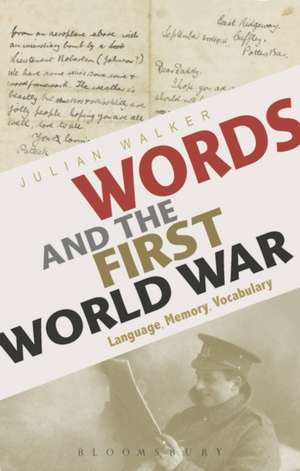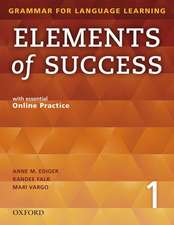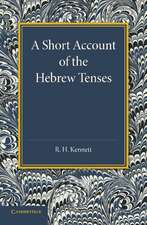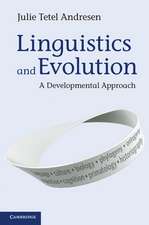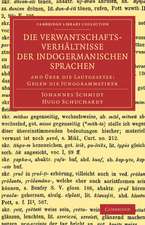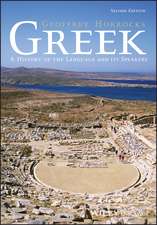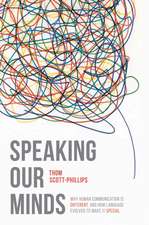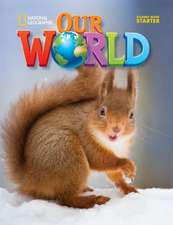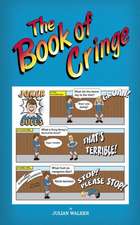Words and the First World War: Language, Memory, Vocabulary
Autor Julian Walkeren Limba Engleză Paperback – 27 dec 2017
| Toate formatele și edițiile | Preț | Express |
|---|---|---|
| Paperback (1) | 137.55 lei 3-5 săpt. | |
| Bloomsbury Publishing – 27 dec 2017 | 137.55 lei 3-5 săpt. | |
| Hardback (1) | 409.61 lei 6-8 săpt. | |
| Bloomsbury Publishing – 27 dec 2017 | 409.61 lei 6-8 săpt. |
Preț: 137.55 lei
Preț vechi: 147.13 lei
-7% Nou
Puncte Express: 206
Preț estimativ în valută:
26.32€ • 28.58$ • 22.11£
26.32€ • 28.58$ • 22.11£
Carte disponibilă
Livrare economică 01-15 aprilie
Preluare comenzi: 021 569.72.76
Specificații
ISBN-13: 9781350001923
ISBN-10: 1350001929
Pagini: 416
Ilustrații: 50 bw images
Dimensiuni: 138 x 216 x 28 mm
Greutate: 0.52 kg
Editura: Bloomsbury Publishing
Colecția Bloomsbury Academic
Locul publicării:London, United Kingdom
ISBN-10: 1350001929
Pagini: 416
Ilustrații: 50 bw images
Dimensiuni: 138 x 216 x 28 mm
Greutate: 0.52 kg
Editura: Bloomsbury Publishing
Colecția Bloomsbury Academic
Locul publicării:London, United Kingdom
Caracteristici
Interesting trends that emerged from this seismic event: a (debated) birth of 'politically correct language', the popularization of acronyms in every day speech, common and habitual use of foreign loan words and slang.
Notă biografică
Julian Walker is a writer, researcher, artist and educator. He is the co-author of Languages and the First World War: Communicating in a Transnational War (2016), the author of The Roar of the Crowd (2016) and Trench Talk (2012) among many others. His website is www.julianwalker.net
Cuprins
Part I: Language, Dialect and the Need to Communicate1. Slang, dialect and status2. The need to communicate3. Understanding 'the other'Part II: Language at the Front4. Our language5. Etymologies6. How lingua franca developed7. Glossaries8. Language as weapon and trophy9. Control, and self-control10. Avoidance11. Wordplay12. The sound of war13. Language in combat14. The destruction of the body15. Failure16. Unacceptable weaponsPart III: 'Us' and 'Them'17. Race18. Naming the enemy19. How others spoke20. Naming 'our' side21. The femalePart IV: The Home Front22. Commerce and war language23. DORA and the control of words24. Outrage25. Women and childrenPart V: Owning the Language26. Class war27. 'Not us'28. Our languagePart VI: Letting Go29. Losing the language of war30. The language of commemoration31. Silence32. Post-war war talk33. War porn34. Then and nowBibliographyIndex
Recenzii
Edifying and readable . [An] indispensable reference [tool] for anyone researching twentieth-century history and literature, not only the documents of war.
This is a substantial book, dense but always accessible, covering both time and space. Gratifyingly, it sidesteps an all too common error that entraps books on words, of becoming no more than a padded dictionary.
An illustrated analytical study, [Words and the First World War] considers the situation at home, at war, and under categories such as race, gender and class to give a many-sided picture of language used during the conflict.
The most striking aspect of this work is its extraordinary scope of research and consequent breadth of material . [This is] an invaluable resource for researchers in all aspects of the First World War, as well as for any reader interested in the relationship between the experience of war and the language which informs it and which it creates . A comprehensive, important and useful contribution to scholarly work.
Julian Walker's Words and the First World War provides a rich account of the linguistic world that emerged from the western front during the First World War. The book convincingly demonstrates that for British and Dominion troops, language functioned as a mechanism for coping with the traumatic experiences of war, a means of dealing with separation from home, and a way of mastering and knowing new, unfamiliar environments . Words and the First World War provides a highly detailed discussion of its topic, based on extensive research of soldiers' diaries, letters, postcards, published memoirs, and trench newspapers, as well as newspapers and other materials produced on the home front. It constitutes one of the most authoritative discussions of trench talk and wartime slang, and forms part of a longer tradition of lexicography . A comprehensive, colorful, and highly engaging exploration of how the First World War transformed the English language.
Words and the First World War is the first comprehensive scholarly examination of how the First World War shaped the English language. Drawing from an impressive range of sources, Julian Walker studies how the language of the front lines became adopted, adapted, and popularised in everything from private letters to newspapers to advertising. This book is destined to be the definitive study of trench talk, propaganda, and words that endured long after the Armistice.
Julian Walker's Words and the First World War is a fine study of the myriad ways soldiers used language as a tool of play and survival. At once moving and amusing, his book should be required reading for that broad section of the public still fascinated by the catastrophe we call the Great War.
Walker's wide-ranging and engaging study of the 'linguistic phenomena' that marked the First World War and shaped its cultural memory makes an important contribution to our understanding of 1914-1918. Through media ranging from letters and postcards to advertisements and books Walker highlights an astonishing range of soldier slang, multilingual exchange, censorship of the written and spoken word (and the ways it was circumvented), home front and family colloquialisms, and the language of sacrifice and remembrance, all accompanied by striking illustrations. Words and the First World War masterfully highlights 'the huge and diverse culture of verbal and written communication' that marked the war years and its aftermath-a culture of words that continues to have resonance one hundred years on.
This is a substantial book, dense but always accessible, covering both time and space. Gratifyingly, it sidesteps an all too common error that entraps books on words, of becoming no more than a padded dictionary.
An illustrated analytical study, [Words and the First World War] considers the situation at home, at war, and under categories such as race, gender and class to give a many-sided picture of language used during the conflict.
The most striking aspect of this work is its extraordinary scope of research and consequent breadth of material . [This is] an invaluable resource for researchers in all aspects of the First World War, as well as for any reader interested in the relationship between the experience of war and the language which informs it and which it creates . A comprehensive, important and useful contribution to scholarly work.
Julian Walker's Words and the First World War provides a rich account of the linguistic world that emerged from the western front during the First World War. The book convincingly demonstrates that for British and Dominion troops, language functioned as a mechanism for coping with the traumatic experiences of war, a means of dealing with separation from home, and a way of mastering and knowing new, unfamiliar environments . Words and the First World War provides a highly detailed discussion of its topic, based on extensive research of soldiers' diaries, letters, postcards, published memoirs, and trench newspapers, as well as newspapers and other materials produced on the home front. It constitutes one of the most authoritative discussions of trench talk and wartime slang, and forms part of a longer tradition of lexicography . A comprehensive, colorful, and highly engaging exploration of how the First World War transformed the English language.
Words and the First World War is the first comprehensive scholarly examination of how the First World War shaped the English language. Drawing from an impressive range of sources, Julian Walker studies how the language of the front lines became adopted, adapted, and popularised in everything from private letters to newspapers to advertising. This book is destined to be the definitive study of trench talk, propaganda, and words that endured long after the Armistice.
Julian Walker's Words and the First World War is a fine study of the myriad ways soldiers used language as a tool of play and survival. At once moving and amusing, his book should be required reading for that broad section of the public still fascinated by the catastrophe we call the Great War.
Walker's wide-ranging and engaging study of the 'linguistic phenomena' that marked the First World War and shaped its cultural memory makes an important contribution to our understanding of 1914-1918. Through media ranging from letters and postcards to advertisements and books Walker highlights an astonishing range of soldier slang, multilingual exchange, censorship of the written and spoken word (and the ways it was circumvented), home front and family colloquialisms, and the language of sacrifice and remembrance, all accompanied by striking illustrations. Words and the First World War masterfully highlights 'the huge and diverse culture of verbal and written communication' that marked the war years and its aftermath-a culture of words that continues to have resonance one hundred years on.
